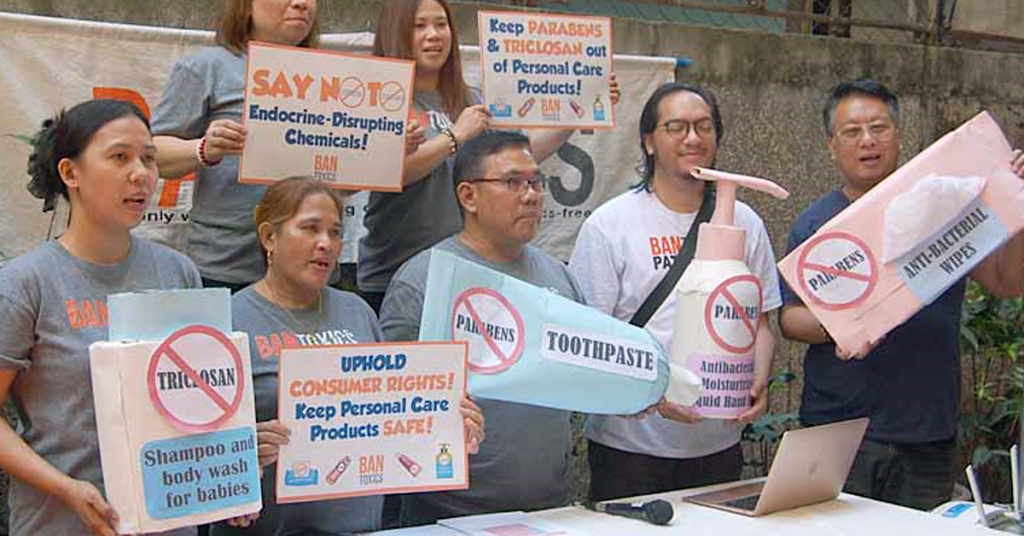
Lumalabas sa Asian study na may endocrine-disrupting chemicals na matatagpuan sa personal care products na mula sa Pilipinas.
Sa isang press briefing kasabay ng pagdiriwang ng World Consumer Rights Month, ibinunyag ng BAN Toxics, isang chemical at waste management NGO, na natuklasan sa laboratory testing kamakailan lang ang pagkakaroon ng parabens, triclosan at triclocarban, na iniuri bilang endocrine disrupting chemicals (EDCs), sa personal care products na ibinebenta sa bansa. Binigyang-diin ng resulta ang mga potensiyal na panganib sa mga sanggol, bata at matatanda dahil lumalabas na may masamang epekto sa kalusugan ang nasabing mga kemikal.
“Among 19 children’s products sent for chemical analysis, propylparabens (PPs) or butyl parabens (BPs) were detected in three products–a brand of kiddie toothpaste, an infant tooth gel brand, both manufactured in the Philippines, and a baby body wash brand made in China. PP was detected in a range from 3.71 μg/g to 152 μg/g. Disturbingly, trace amounts of isobutylparaben—a chemical compound banned for use in cosmetic products under the regulations in the country, within ASEAN and European Cosmetic Regulation—were detected. Triclosan and triclocarban, antibacterial chemicals added to consumer products, have likewise been detected in a liquid hand soap and a deodorant.
“While most of the specific brands analyzed may be largely compliant with national standards in terms of chemical concentration, the empirical evidence that EDCs are present in products either mouthed by children or applied to their skin is equally worrisome. While low doses may seem harmless, the daily use of numerous products could potentially lead to various health issues,” saad ni Jam Lorenzo, BAN Toxics research and policy development officer.
Walong bansa sa Asya, kabilang na ang Pilipinas, ang kasali sa product survey na isinagawa ng South Korea-based Wonjin Institute for for Occupational & Environmental Health (WIOEH) in 2023, na suportado ng Korean Financial Industry Foundation (KFIF).
“The aim of the study was to assess the presence of Endocrine-Disrupting Chemicals (EDCs) in personal care products and determine compliance to international and domestic standards and labeling requirements, focusing on the potential presence of propylparabens (PBs) and butylparabens (BBs) in personal care products. The identification of nine parabens, triclosan, and triclocarban involved the utilization of high-performance liquid chromatography-mass spectrometry (HPLC-MS/MS) for chemical analysis to obtain the results,” ayon kay Dr. Won Kim ng WIOEH.
“Infants and toddlers are especially vulnerable to the impacts of chemicals due to their ongoing physical development. Parabens, when applied to the skin, are easily and directly absorbed into the body. These products may also be consumed or inhaled, leading to absorption into the blood and distribution throughout the system. With the current baby and child skin care market in the Philippines estimated at 1.5 million and given the increasing trend, more and more Filipino babies and children are becoming exposed to these hazardous chemicals,” saad ni Lorenzo.
“Parabens belong to a class of chemicals commonly used as preservatives in various consumer products and most widely used in cosmetics. They are considered chemicals of emerging concern, as scientific findings suggest their ability to interfere with the functioning of the endocrine system, potentially disrupting hormone activity in the body and posing risks to fertility, reproductive organs, birth outcomes, increasing the risk of cancer, and causing skin irritation. BPs and PPs specifically have been shown to disrupt the male reproductive system,” dagdag pa nito.
“Triclosan may play a role in a variety of health issues including endocrine dysfunction, irregular embryonic development, and immune suppression.”
Ipinagbawal ng US Food and Drug Administration simula 2016 ang pagbebenta ng consumer antiseptic wash products na nagtataglay ng triclosan at triclocarban bilang active ingredients. Hinigpitan din ng EU Regulation 2014/358, na ipinatupad noong 2014, ang paggamit ng triclosan sa mga rinse-off products o produktong hinuhugasan matapos ipahid. Sa madaling salita, hindi pinahihintulutan ang paggamit ng triclosan bilang preservative sa body lotions at skin care creams. Ipinagbawal din nito ang paggamit ng ticlosan sa mouthwash at nagtakda ng limitasyon sa paggamit sa cosmetics products, na nililimitahan ang concentrations sa maximum na 0.2%.
“Additionally, we have to worry about fragrance allergens in personal care products, because we found that 14 kinds of fragrance allergens were listed in 50 products (14%) purchased in Asian countries. It is well known that fragrance allergens are related with contact dermatitis and respiratory effects,” ayon kay Won.
“Survey results further confirm manufacturers’ non-compliance with ingredient labeling in the products, a mandatory requirement. Five out of 65 products did not match the label, in violation of the ASEAN Cosmetics Directive, an agreement among ASEAN countries that prescribes proper labeling of cosmetic products to ensure truthful and accurate information,” dagdag niya.
“Eight product types were tested, including antivirus wipes, baby wipes, deodorant, toothpaste, body wash, feminine wash, hand wash, and mouthwash,” Won elaborated. “Among the products with ingredient labels, there were 269 products from all participating countries that did not separately label parabens, triclosan, and triclocarban. Out of these, a total of 60 labels were found to be incorrect.”
Ipinaliwanag ng BAN Toxics na lumalabas sa nasabing pagsusuri na kailangan ng mahigpit na regulasyon sa cosmetics at personal care products. Dapat humanap ang cosmetic industry ng alternatibo at palitan ang parabens, triclosan at triclocarban ng ibang ligtas na kemikal o natural preservatives upang maiwasan ang negatibong epekto sa kalusugan ng tao.
“We support and join WIOEH’s recommendations to regulatory agencies to conduct a national market survey to ensure regulatory compliance. Urgent measures must be taken to enforce stricter regulations concerning children’s products. Considerations should be given to issuing a joint declaration among participating countries to prohibit the use of PP and BP in children’s and feminine products,” ayon kay Thony Dizon, BAN Toxics advocacy officer.
“One meaningful practice of exercising our consumer rights is to carefully read ingredient lists of the cosmetic products we purchase, seek out brands labeled ‘paraben-free’ and ‘triclosan-free’, and avoid those containing listed endocrine-disrupting chemicals,” apela pa ni Dizon sa publiko.











More Stories
Impeachment Hindi Dapat Ginagawang Opsyonal
Bigas Bagsak Presyo! P20 Kada Kilo Lumalawak na — PSA
UP Law Profs sa Senado: Impeachment ni VP Sara Ituloy